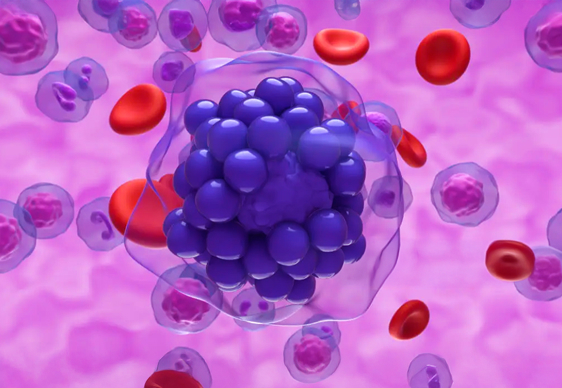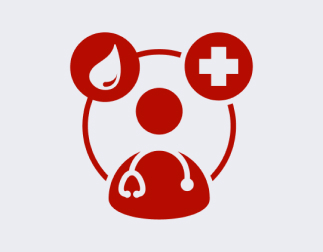Lymphoma
About half of the blood cancers that occur each year are lymphomas, or cancers of the lymphatic system. This system - composed of lymph nodes in your neck, armpits, groin, chest, and abdomen - removes excess fluids from your body and produces immune cells. Abnormal lymphocytes, a type of white blood cell that fights infection, become lymphoma cells, which multiply and collect in your lymph nodes. Over time, these cancerous cells impair your immune system.

Categories of Lymphoma
Lymphomas are divided into two categories: Hodgkin lymphoma and non-Hodgkin lymphoma. About 12 percent of people with lymphoma have Hodgkin lymphoma. Because of breakthrough research, this once fatal diagnosis has been transformed into a curable condition. Most non-Hodgkin lymphomas are B-cell lymphomas, and either grow quickly (high-grade) or slowly (low-grade). There are over a dozen types of B-cell non-Hodgkin lymphomas. The rest are T-cell lymphomas, named after a different cancerous white blood cell, or lymphocyte.
Many lymphoma patients are able to lead active lives as they receive treatment for their symptoms and are monitored by their doctors
Am I at Risk?
The exact causes of lymphoma remain unknown; however, the following factors increase your risk of developing the disease:
- Older age
- Male
- Caucasian
- Having an autoimmune disease
- HIV/AIDS
- Diet high in meats and fat
- Being exposed to certain pesticides
Symptoms of lymphoma include the following:
- Swollen lymph nodes in the neck, armpits, or groin
- Fever
- Weakness and fatigue
- Weight loss
- Sweating
- Difficulty breathing or chest pain
- Itchy skin
- Rash
How Is Lymphoma Treated?
Your doctor will perform a lymph node biopsy to diagnose lymphoma. Additional tests are then conducted to determine the stage (extent) of the lymphoma including blood tests, bone marrow biopsies, and imaging tests, such as a CT scan or PET scan. Imaging tests show whether the lymphoma has spread to other parts of your body, like the spleen and lungs. Decisions about treatment are then determined by your doctor, who will consider your age, general health, and stage and type of lymphoma. Hodgkin lymphoma is one of the most curable types of cancer.
Treatment options include the following:
- Chemotherapy
- Chemotherapy and radiation that directly targets the lymphoma
- Immunotherapy, such as CAR T-cell therapy, directed at lymphoma cells
- Stem cell transplant
For some patients, participating in a clinical trial provides access to experimental therapies. If you are diagnosed with lymphoma, talk with your doctor about whether joining a clinical trial is right for you.
Is Lymphoma Preventable?
Because the cause of lymphoma remains unknown, there is no real way to prevent it. However, if you think you may be exhibiting signs of lymphoma, being aware of the risk factors and symptoms and talking with your doctor are critical to early diagnosis and treatment. It is especially important if you have a family history of lymphoma to look out for symptoms and share your family medical history with your doctor. In a small number of patients, there is a familial/genetic risk.
If you suspect that you have or are at risk for lymphoma, talk with your doctor about detection and treatment. Depending on your physical condition, genetics, and medical history, you may be referred to a hematologist, a doctor who specializes in blood conditions.
Lymphoma: A Patient's Journey
Where Can I Find More Information?
If you are interested in learning more about blood diseases and disorders, here are a few resources that may be helpful.


